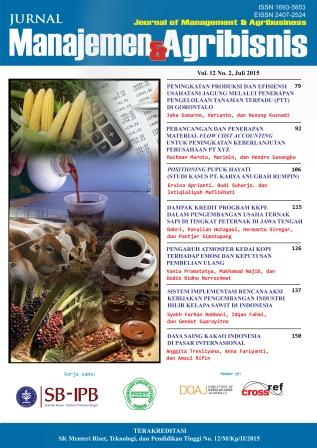PERANCANGAN DAN PENERAPAN MATERIAL FLOW COST ACCOUNTING UNTUK PENINGKATAN KEBERLANJUTAN PERUSAHAAN PT XYZ
Abstract
This research aimed to answer the questions of sustainability of palm oil processing PT XYZ in the economic, social, environmental and technology with the design and implementation of Material Flow Cost Accounting (MFCA). MFCA provides open information about the classification of production costs, with special attention to the cost of material loss and production waste. The goal is efficiency and effectiveness of production cost which can increase the performance of the production process as well as providing an influence on the value of corporate sustainability. The method used in this research was a mixture of qualitative and quantitative method. Measuring tool used multiple regression analysis to measure the significance of independent variables on the dependent variables. As additional analyses used Multidimensional Scaling (MDS) method with rapMFCA techniques and Analytical Hierarchy Process (AHP) method with a pairwise comparison technique for assessed corporate sustainability indexes for every dimension and weight combined. The analysis showed that the MFCA provides significant effect as the results of the F test, t test and probability test. The results obtained with this technique showed that the value of sustainability index after merging weight is 85,33 and is in the category of highly sustainable. From these results the performance formulation formulated suggestions for maintaining the stability of the production process of corporate sustainability indexes.
Keywords: corporate sustainability, efficiency and effectiveness of production cost, material flow cost accounting, production process performanc
ABSTRAK
Penelitian ini berusaha menjawab permasalahan keberlanjutan perusahaan pengolahan kelapa sawit PT XYZ dalam dimensi ekonomi, sosial, lingkungan dan teknologi dengan perancangan dan penerapan Material Flow Cost Accounting (MFCA). MFCA memberikan informasi terbuka tentang klasifikasi biaya produksi, dengan perhatian khusus kepada biaya kerugian material dan limbah produksi yang dihasilkan. Tujuan yang hendak dicapai adalah efisiensi dan efektivitas biaya produksi yang dapat mendorong peningkatan kinerja proses produksi sekaligus memberikan pengaruh terhadap nilai keberlanjutan perusahaan. Alat ukur yang digunakan adalah regresi berganda untuk mengukur signifikansi pengaruh variabel bebas terhadap variabel terikat. Sebagai analisis tambahan digunakan metode Multidimensional Scaling (MDS) dengan teknik rapMFCA serta metode Analytical Hierarchy Process (AHP) dengan teknik perbandingan berpasangan untuk menilai indeks keberlanjutan perusahaan setiap dimensi dan secara bobot gabungan. Hasil analisis menunjukkan bahwa MFCA memberikan pengaruh signifikan dari hasil uji F, uji t dan uji probabilitas. Hasil yang diperoleh dengan teknik ini menunjukkan bahwa nilai indeks keberlanjutan setelah penggabungan bobot adalah 85,33 dan berada pada kategori sangat berkelanjutan. Dari hasil ini dirumuskan saran perbaikan kinerja proses produksi untuk menjaga stabilitas indeks keberlanjutan perusahaan.
Kata kunci: efisiensi dan efektivitas biaya produksi, keberlanjutan perusahaan, kinerja proses produksi, material flow cost accounting
Keywords: corporate sustainability, efficiency and effectiveness of production cost, material flow cost accounting, production process performanc
ABSTRAK
Penelitian ini berusaha menjawab permasalahan keberlanjutan perusahaan pengolahan kelapa sawit PT XYZ dalam dimensi ekonomi, sosial, lingkungan dan teknologi dengan perancangan dan penerapan Material Flow Cost Accounting (MFCA). MFCA memberikan informasi terbuka tentang klasifikasi biaya produksi, dengan perhatian khusus kepada biaya kerugian material dan limbah produksi yang dihasilkan. Tujuan yang hendak dicapai adalah efisiensi dan efektivitas biaya produksi yang dapat mendorong peningkatan kinerja proses produksi sekaligus memberikan pengaruh terhadap nilai keberlanjutan perusahaan. Alat ukur yang digunakan adalah regresi berganda untuk mengukur signifikansi pengaruh variabel bebas terhadap variabel terikat. Sebagai analisis tambahan digunakan metode Multidimensional Scaling (MDS) dengan teknik rapMFCA serta metode Analytical Hierarchy Process (AHP) dengan teknik perbandingan berpasangan untuk menilai indeks keberlanjutan perusahaan setiap dimensi dan secara bobot gabungan. Hasil analisis menunjukkan bahwa MFCA memberikan pengaruh signifikan dari hasil uji F, uji t dan uji probabilitas. Hasil yang diperoleh dengan teknik ini menunjukkan bahwa nilai indeks keberlanjutan setelah penggabungan bobot adalah 85,33 dan berada pada kategori sangat berkelanjutan. Dari hasil ini dirumuskan saran perbaikan kinerja proses produksi untuk menjaga stabilitas indeks keberlanjutan perusahaan.
Kata kunci: efisiensi dan efektivitas biaya produksi, keberlanjutan perusahaan, kinerja proses produksi, material flow cost accounting
Authors
MarotaR., MariminM., & SasongkoH. (2015). PERANCANGAN DAN PENERAPAN MATERIAL FLOW COST ACCOUNTING UNTUK PENINGKATAN KEBERLANJUTAN PERUSAHAAN PT XYZ. Jurnal Manajemen & Agribisnis, 12(2), 92. https://doi.org/10.17358/jma.12.2.92
Authors who publish with this journal agree to the following terms:
- Authors retain copyright and grant the journal right of first publication with the work simultaneously licensed under a Creative Commons Attribution License that allows others to share the work with an acknowledgement of the work's authorship and initial publication in this journal.
- Authors are able to enter into separate, additional contractual arrangements for the non-exclusive distribution of the journal's published version of the work (e.g., post it to an institutional repository or publish it in a book), with an acknowledgement of its initial publication in this journal.
- Authors are permitted and encouraged to post their work online (e.g., in institutional repositories or on their website) prior to and during the submission process, as it can lead to productive exchanges, as well as earlier and greater citation of published work (See The Effect of Open Access).

